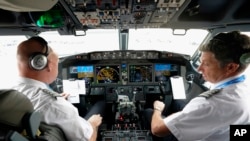U.S. House and Senate negotiators said early Monday they had reached a deal to boost air traffic controller staffing and boost funding to avert runway close-call incidents, but will not increase the airline pilot retirement age to 67 from 65.
The U.S. House of Representatives in July voted 351-69 on a sweeping bill to reauthorize the Federal Aviation Administration (FAA) that would also raise the mandatory pilot retirement age to 67 but the Senate Commerce Committee had voted in February to reject the retirement age increase. International rules would have prevented airline pilots older than 65 from flying in most countries outside the United States.
Congress has temporarily extended authorization for the FAA through May 10 as it works on a new $105 billion, five-year deal. The Senate is set to vote this week on the more than 1,000-page bipartisan proposal.
The bill prohibits airlines from charging fees for families to sit together and requires airlines to accept vouchers and credits for at least five years, but did not adopt many stricter consumer rules sought by the Biden administration.
The bill also requires airplanes to be equipped with 25-hour cockpit recording devices and directs the FAA to deploy advanced airport surface technology to help prevent collisions.
Efforts to boost aviation safety in the United States have taken on new urgency after a series of near-miss incidents and the Jan. 5 Alaska Airlines Boeing 737 MAX 9 door plug mid-air emergency.
Senate Commerce Committee chair Maria Cantwell, the panel's top Republican, Ted Cruz, House Transportation Committee chair Sam Graves and the committee's top Democrat, Rick Larsen, in a joint statement announced the agreement and said, "now more than ever, the FAA needs strong and decisive direction from Congress to ensure America’s aviation system maintains its gold standard."
The proposal raises maximum civil penalties for airline consumer violations from $25,000 per violation to $75,000 and aims to address a shortage of 3,000 air traffic controllers by directing the FAA to implement improved staffing standards and to hire more inspectors, engineers and technical specialists.
Congress will not establish minimum seat size requirements, leaving that instead to the FAA. The bill requires the Transportation Department to create a dashboard that shows consumers the minimum seat size for each U.S. airline.
The bill boosts by five the number of daily direct flights from Washington Reagan National Airport.
Cantwell said the agreement — including a five-year reauthorization for the National Transportation Safety Board — demonstrates aviation safety and stronger consumer standards are a big priority.









